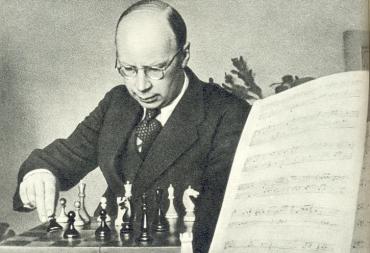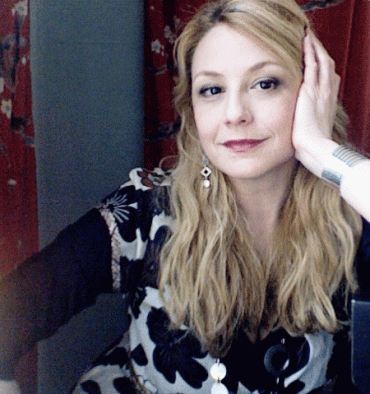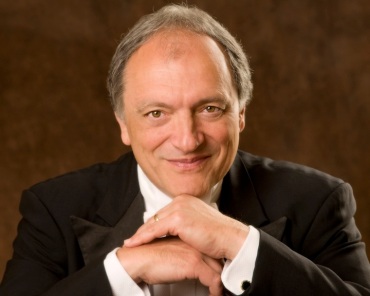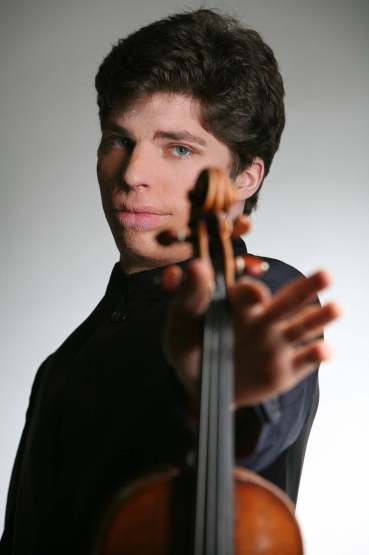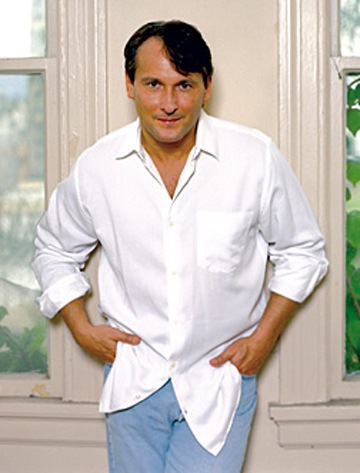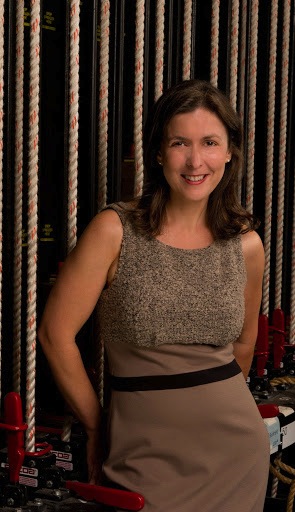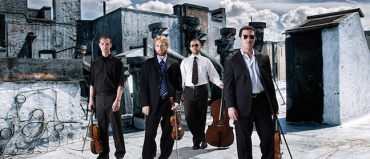The Well-Tempered Ear
Classical music: The Madison Opera stages its first-ever production of Dvorak’s fairy tale opera “Rusalka” next Friday night and Sunday afternoon. A preview roundtable is this Sunday afternoon
Leave a Comment
IF YOU LIKE A CERTAIN BLOG POST, PLEASE SPREAD THE WORD. FORWARD A LINK TO IT OR, SHARE or TAG IT (not just “Like” it) ON FACEBOOK. Performers can use the extra exposure to draw potential audience members to an event.
By Jacob Stockinger
The Madison Opera will stage its production of Antonin Dvorak’s luxurious masterpiece Rusalka on Friday night, April 26, at 8 p.m. and Sunday afternoon, April 28, at 2:30 p.m. in Overture Hall at the Overture Center, 201 State Street.
Running time is 3 hours with two intermissions, and will feature projected supertitles with English translations of the original Czech that will be sung.
Tickets are $18-$131 with discounts available for students and groups. Go to: https://www.madisonopera.org/tickets/
Inspired by the classic fairy tale The Little Mermaid, the story travels from a mythical forest to a palace and back again. Its lush score includes the famous “Song to the Moon.” (You can hear Renée Fleming sing”Song to the Moon” in the YouTube video at the bottom.)
Set in a mythical realm, Rusalka is about a water nymph who falls in love with a human prince. She tells her father Vodnik that she wishes to become human and live with the Prince on land. Horrified, Vodnik tells her that humans are full of sin, but reluctantly suggests she enlist the help of Jezibaba, a witch. Jezibaba agrees to make her human, but cautions that Rusalka will lose her power of speech. Further, if the Prince betrays her, she will be cursed forever.
The Prince falls in love with Rusalka and plans to marry her, but her silence unnerves him, and a Foreign Princess interrupts the wedding festivities with evil intent. Rusalka returns to the lake as a spirit that lures men to their death – and the Prince follows her.
“Rusalka is one of the most gorgeous operas in the repertoire,” says Kathryn Smith, Madison Opera’s general director (below, in a photo by James Gill). “I fell in love with it when I first saw it over 20 years ago, and listening to the score is a pure pleasure. I am so delighted to share this opera with Madison, so that everyone can learn how brilliant an operatic composer Dvorak was, and experience an opera that is justifiably popular around the world.”
Rusalka’s story was inspired by multiple sources, including Slavic mythology and the fairy tales of Karel Jaromir Erben, Hans Christian Andersen, and Friedrich de la Motte Fouqué.
The opera premiered on March 31, 1901 in Prague and quickly became a massive success, hailed as Dvorak’s masterpiece.
But it was not initially widely performed outside of Czech territories; the first U.S. performance was in 1975. But in recent decades, the opera by Dvorak (below) has become a regular part of the opera repertoire, due to its beautiful music and lovely story.
This production is not only a Madison Opera premiere, but also the company’s first-ever opera in Czech.
Madison Opera’s cast features both returning artists and debuts.
Soprano Emily Birsan (below) returns to Madison Opera in the title role, following successes here as Gounod’s Juliet and Musetta in Puccini’s La Bohème. Last month, she sang Violetta in Verdi’s La Traviata at the Lyric Opera of Chicago. The Chicago Tribune has praised her singing for her “amazing clarity of diction, accuracy of intonation and fineness of expression.”
Tenor John Lindsey (below) returns to Madison Opera as The Prince, after singing in last summer’s Opera in the Park.
Making their debuts with Madison Opera are soprano Karin Wolverton as the Foreign Princess, contralto Lindsay Amman as the witch Jezibaba and bass William Meinert as Rusalka’s father, Vodnik. Emily Secor, Saira Frank and Kirsten Larson play the three wood sprites; Benjamin Liupaogo sings the Hunter.
The Madison Opera Chorus and Madison Symphony Orchestra round out the musical forces, all under the baton of John DeMain (below, in a photo by Greg Anderson), Madison Opera’s artistic director.
Keturah Stickann (below) directs her first opera for Madison Opera; she has directed both traditional and contemporary repertoire across all of the U.S., most recently for San Francisco Opera and Washington National Opera.
This production originated at Minnesota Opera and features projections (below) by Wendall K. Harrington, who has been described as “the godmother of modern projection design.”
In reviewing the Minnesota production, theTwin Cities Arts Reader praised “the stunning visuals on display, which only serve to enhance and elaborate on the action and the music.”
Madison Opera’s production of “Rusalka” is sponsored by the National Endowment for the Arts, Kay & Martin Barrett, Millie & Marshall Osborn, Sally & Mike Miley, Kato Perlman, Charles & Martha Casey, John Lemke & Pam Oliver, and The Ann Stanke Fund.
RELATED EVENTS
You can learn more about “Rusalka” at the events leading up to the performances.
Opera Up Close will take place this Sunday, April 21, 1-3 p.m. at the Margaret C. Winston Opera Center (below) 335 West Mifflin Street, $20 general admission; free for full-season subscribers; $10 for two-show subscribers.
This event features a multimedia behind-the-scenes preview of Rusalka. General director Kathryn Smith will discuss Antonin Dvorak and the history of his fairy-tale opera. Principal artists, stage director Keturah Stickann and conductor John DeMain will participate in a roundtable discussion about Madison’s production and their own takes on this masterpiece.
Pre-Show Talks by Kathryn Smith take place on Friday, April 26, at 7 p.m. and Sunday, April 28, at 1:30 p.m. at Wisconsin Studio at Overture Center, and are free to ticket holders.
Post-Opera Q&A’s are on Friday, April 26, and Sunday, April 28, immediately following the opera in the Wisconsin Studio at Overture Center, and are free to ticket holders.
More information — including cast biographies and a blog with Q&A interviews with some cast members — is available at https://www.madisonopera.org and https://www.madisonopera.org/2018-2019-season/rusalka/.
Tags: #AntoninDvorak, #ArtisticDirector, #BassSinger, #Beautifulmusic, #BenjaminLiupaogo, #BlogPost, #BlogPosting, #CharlesGounod, #ChicagoIllinois, #ChoralMusic, #ContemporaryOpera, #ContemporaryRepertoire, #ContraltoSinger, #CzechRepublic, #EmilyBirsan, #EnglishTranslation, #FacebookPost, #FacebookPosting, #FairyTale, #FriedrichdelaMotteFourqué, #GiacomoPuccini, #GiuseppeVerdi, #HansChristianAndersen, #JohnDeMain, #JohnLIndsey, #KarelJaromirErben, #KathrynSmith, #KatoPerlman, #KeturahStickann, #LaTraviata, #LyricOperaofChicago, #MadisonOpera, #MadisonOperaCenter, #MadisonOperaChorus, #MadisonSymphonyOrchestra, #MeadWitterSchoolofMusic, #MinnesotaOpera, #MusicDirector, #NationalEndowmentfortheArts, #OperaCenter, #OperaInThePark, #OperaMusic, #OperaRepertoire, #OvertureCenter, #OvertureHall, #PreludeDiscussion, #RenéeFleming, #RomeoandJuliet, #SanFranciscoOpera, #Sin, #SongtotheMoon, #SopranoSinger, #StageDirector, #TenorSinger, #TheChicagoTribune, #TheLittleMermaid, #TraditionalMusic, #TraditionalRepertoire, #TwinCities, #UnitedStates, #UniversityofWisconsin-Madison, #WashingtonNationalOpera, #WaterNymph, #WendallK.Harrington, #WisconsinStudio, #WoodSprite, #WorldPremiere, #YouTubevideo, accuracy, action, admission, afternoon, amazing, Antonín Dvořák, Artistic director, artists, Arts, bass, beautiful, beauty, Benjamin Liupaogo, biographies, biography, blog, brilliant, cast, Charles Gounod, Chicago, choral music, clarity, classic, Classical music, company, composer, Concert, conductor, contemporary, contralto, curse, Czech, Czech Republic, deace, death, debut, delight, design, diction, director, discount, discussion, donor, Dvorak, elaborate, Emily Birsan, enhance, event, evil, expression, Facebook, fairy tale, famous, father, firest, foreign, Friday, Friederich de la Motte Fourqué, funding, general, General director, Giuseppe Verdi, godmother, gorgeous, group, Hans Christian Andersen, History, hour, human, hunter, intent, intermission, interview, intonation, Jacob Stockinger, John DeMain, John Lindsey, Karel Jaromir Erben, Kathryn Smith, Kato Perlman, Keturah Stickann, La Traviata, land, Love, lovely, lure, lush, Lyric Opera of Chicago, Madison, Madison Opera, Madison Opera Center, Madison Opera Chorus, Madison Symphony Orchestra, marry, massive, masterpiece, Mead Witter School of Music, men, Minnesota, Minnesota Opera, moon, multimedia, multiple, Musetta, Music, Music director, musical, mythical, mythology, National Endowment for the Arts, NEA, night, nymph, opera, opera center, Opera in the Park, operatic, Orchestra, original, Overture Center, Overture Hall, palace, part, pleasure, popular, power, Prague, Prelude, Prelude Discussion, premiere, preview, prince, princess, principal, production, project, projection, Puccini, pure, Q&A, realm, recent, regular, Renée Fleming, repertoire, returning, Romeo and Juliet, roundtable, Rusalka, San Francisco Opera, score, silence, sing, Singing, Slavic, song, Song to the Moon, soprano, source, speech, sprite, stage director, story, Student, stunning, subscriber, success, summer, Sunday, sung, supertitle, tenor, terrioty, territories, The Chicago Tribune, The Little Mermaid, ticket, traditional, translation, Twin Cities, U.S., United States, University of Wisconsin, University of Wisconsin-Madison School of Music, University of Wisconsin–Madison, UW-Madison, Verdi, Violetta, visual, vocal music, Washington National Opera, water, water nymph, wedding, Wendall K. Harrington, Wisconsin, Wisconsin Studio, witch, wood, world, world premiere, YouTube
Classical music: With actors and multimedia, the Madison Symphony Orchestra explores Felix Mendelssohn in Italy this coming Sunday afternoon
1 Comment
IF YOU LIKE A CERTAIN BLOG POST, PLEASE SPREAD THE WORD. FORWARD A LINK TO IT OR, SHARE or TAG IT (not just “Like” it) ON FACEBOOK. Performers can use the extra exposure to draw potential audience members to an event.
By Jacob Stockinger
This coming Sunday afternoon, Jan. 20, at 2:30 p.m. in Overture Hall, the Madison Symphony Orchestra (MSO) and its music director John DeMain will present the story behind Felix Mendelssohn’s Symphony No. 4 “Italian” with Beyond the Score®: Mendelssohn Symphony No. 4: Why Italy? (Ticket information is further down.)
The concert is a multimedia examination of German composer Felix Mendelssohn’s travels through Italy.
Starring American Players Theatre actors Sarah Day (below top), Jonathan Smoots (below middle) and Nate Burger (below bottom), the concert experience features visual projections, photos, musical excerpts and a full performance of the Symphony No. 4 by the MSO, with John DeMain conducting, in the second half.
In 1830, a young 21-year-old Mendelssohn (below) visited the Italian countryside and the historic cities of Venice, Naples and Rome.
Three years later, he set his journey to music and composed his fourth Symphony — later to be known as his “Italian” Symphony. Though it eventually became one of the composer’s most popular works, the piece was performed only twice during his lifetime and published four years after his death in 1851. (You can hear the rousing final movement of the “Italian Symphony” in the YouTube video at the bottom.)
Designed for classical music lovers and newcomers looking for a deeper look into the world of classic music and the motivations of significant compositions, “Beyond the Score®: Why Italy?” joins Mendelssohn on his travels in Italy and discovers his inspiration for this symphonic work.
Incorporating the composer’s own letters and writings, the program presents the historical context behind the classical piece turned masterpiece.
Program notes by J. Michael Allsen are available at: http://www.allsenmusic.com/NOTES/1819/4AJan19.html
Single Tickets are $16 to $70 each, available at https://madisonsymphony.org/event/beyond-the-score-mendelssohn/, through the Overture Center Box Office at 201 State Street, or by calling the box office at (608) 258-4141.
Groups of 10 or more can save 25% by calling the MSO office at (608) 257-3734. For more information, visit https://madisonsymphony.org/concerts-events/buy-tickets/group-discounts/.
Student rush tickets can be purchased in person on the day of the concert at the Overture Center Box Office at 201 State Street. Students must show a valid student ID and can receive up to two $10 or $20 tickets. More information is at: https://madisonsymphony.org/concerts-events/buy-tickets/offers-discounts/. Students can receive 20% savings on seats in select areas of the hall on advance ticket purchases.
Seniors age 62 and up receive 20% savings on advance and day-of-concert ticket purchases in select areas of the hall.
Discounted seats are subject to availability, and discounts may not be combined.
Exclusive funding for this concert is provided by the Pleasant T. Rowland Foundation. Beyond the Score® is a production of the Chicago Symphony Orchestra. Gerard McBurney is the Creative Director for Beyond the Score®
Tags: #AmericanPlayersTheatre, #BeyondTheScore, #BlogPost, #BlogPosting, #BoxOffice, #ChicagoSymphonyOrchestra, #FacebookPost, #FacebookPosting, #FelixMendelssohn, #GerardMcBurney, #GermanComposer, #ItalianSymphony, #JohnDeMain, #JonathanSmoots, #MadisonSymphonyOrchestra, #MeadWitterSchoolofMusic, #MusicalExcerpt, #NaplesItaly, #NateBurger, #OvertureHall, #PleasantT.Rowland, #RomeItaly, #SarahDay, #SeniorCitizen, #SpringGreen, #UniversityofWisconsin, #UniversityofWisconsin-Madison, #VeniceItaly, #YouTubevideo, Actor, American Players Theatre, APT, Arts, audience, Beyond the Score, blog, box office, Chicago, Chicago Symphony Orchestra, cities, city, Classical music, composer, Composition, Concert, countryside, creative, death, director, discount, discover, Europe, examination, excerpt, experience, Facebook, Felix Mendelssohn, forward, foundation, funding, Gerard McBurney, German, group, hall, historic, ID, inspiration, Italian Symphony, Italy, Jacob Stockinger, John DeMain, Jonathan Smoots, lifetime, like, link, lover, Madison, Madison Symphony Orchestra, Mead Witter School of Music, media, motivation, MSO, multimedia, Music, musical, musical excerpt, Naples, Nate Burger, newcomer, Orchestra, Overture Center, Overture Hall, performer, photo, Pleasant T. Rowland, popular, production, projection, publish, Rome, Sarah Day, seat, senior, senior citizen, share, Sunday, symphonic, symphony, tag, ticket, travel, United States, University of Wisconsin, University of Wisconsin-Madison School of Music, University of Wisconsin–Madison, UW-Madison, Venice, visual, Wisconsin, work, world, YouTube
Classical music: This week the UW-Madison will put the spotlight on vocal music reclaimed from the Nazis and contemporary theater music inspired by Samuel Beckett
Leave a Comment
By Jacob Stockinger
Coming just before the Spring Break, this week will be a busy one at the University of Wisconsin-Madison’s Mead Witter School of Music.
Here are the highlights that include a lecture and a concert about vocal music resurrected from the Nazis as well as an evening of contemporary works inspired by the 20th-century playwright Samuel Beckett.
But other important events, including some graduate student recitals, are also on the Events Calendar at https://www.music.wisc.edu/events/.
All events listed here are FREE and OPEN TO THE PUBLIC.
TODAY
Tonight at 6:30 p.m. in Morphy Recital Hall, guest trumpeter Richard Illman (below) with present a multimedia video concert with UW trombonist Mark Hetzler and UW trumpeter Alex Noppe.
Sorry, no word on composers or works on the program.
For more information, go to: https://www.music.wisc.edu/event/guest-artist-richard-illman-trumpet-special-multi-media-concert/
At 7 p.m. in 2411 Humanities Building, a FREE lecture will be given by the guest award-winning singer Kristina Bachrach and UW pianist Daniel Fung on the “Rediscovered Voices Initiative.” The project seeks to reclaim musicians and musical works that were killed or suppressed by the Nazis during World War II. (This lecture was originally scheduled for March 9.)
The duo will also give a performance Tuesday night. For details, see below.
For more information, go to:
TUESDAY
At 7 p.m. in Music Hall, at the foot of Bascom Hill, guest singer Kristina Bachrach and UW pianist Daniel Fung (below) will give a concert for the “Recovered Voices Initiative” that rediscovers and revives music and musicians lost to the Nazis in World War II. (The concert was originally scheduled for March 10.)
For more information about the performers, the project and the complete program, go to:
WEDNESDAY
At 7:30 p.m. In Mills Hall, a FREE concert will be given by the UW Concert Band (below top) under Mike Leckrone (below bottom). Sorry, no word on the program.
FRIDAY
At 1:30 p.m. in Music Hall, the Decoda Chamber Ensemble (below in a photo by Matt Dine) from New York City will give a FREE and PUBLIC master class and workshop for student chamber ensembles. The focus is on interactive performance and audience engagement.
No word on composer or pieces. But for more information, go to:
https://www.music.wisc.edu/event/master-class-decoda-chamber-ensemble/
At 7:30 p.m. in Mills Hall, “Sounding Beckett” will be presented. The concert features the intersection of music and drama as inspired by the Nobel-Prize winning playwright Samuel Beckett (below).
The performers feature guest group Cygnus Ensemble (below), which will play six short musical works based on three of Beckett’s one-act plays (“Footfalls,” “Ohio Impromptu” and “Catastrophe”).
The two works for each play include compositions by UW-Madison alumnus Chester Biscardi (below top) and current UW composer Laura Schwendinger (below bottom). You can hear Biscardi’s music for “Ohio Impromptu” in the YouTube video at the bottom.
There will also be instrumental master classes, a lecture and panel discussion with UW drama professor Patricia Boyette as well as Laura Schwendinger.
NOTE: A master class will also be held but the date, time and place have not yet been announced.
For an excellent longer story with more background and details, go to:
Tags: #ChamberMusic, #ChesterBiscardi, #CygnusEnsemble, #DecodaChamberEnsemble, #LauraSchwendinger, #MeadWitterSchoolofMusic, #MikeLeckrone, #NewMusic, #NobelPrize, #RecoveredVoiceInitiative, #SamuelBeckett, #TromboneMusic, #TrumpetMusic, #UniversityofWisconsin, #UniversityofWisconsin-Madison, #VocalMusic, #WorldWarII, alumni, alumnus, Arts, audience, award, award-winning, band, Cello, Chamber music, Chester Biscardi, Classical music, composer, Concert, Concert Band, Cygnus, Decoda, drama, faculty, free, Jacob Stockinger, Laura Schwendinger, lecture, Madison, master class, Mead Witter School of Music, Mike Leckrone, multimedia, Music, Nazi, Nazism, New Music, New York City, one-act, panel discussion, Piano, play, playwright, program'work, public, rediscover, rediscovery, resurrect, Resurrection, revival, revive, Richard Illman, Samuel Beckett, singer, Singing, song, Student, students, theater, theatre, Trombone, Trumpet, United States, University of Wisconsin-Madison School of Music, University of Wisconsin–Madison, video, Viola, Violin, vocal music, voice, voices, win, Wisconsin, works, World War II, YouTube
Classical music: On Sunday, the Madison Symphony Orchestra will crack the code of Elgar’s “Enigma” Variations
1 Comment
By Jacob Stockinger
So what is the mystery or puzzle behind the famous “Enigma” Variations by the British composer Sir Edward Elgar?
On this Sunday afternoon, the Madison Symphony Orchestra (MSO, below) and music director John DeMain will explore Sir Edward Elgar’s famous and frequently performed Enigma Variations.
The concert is at 2:30 p.m. in Overture Hall of the Overture Center, 201 State Street. Ticket information is below.
Created by the Chicago Symphony Orchestra, “Beyond the Score® Elgar: Enigma Variations” is a musical experience that involves a multimedia examination of the music. This is the third “Beyond the Score” production done by the MSO.
The first half is accompanied by photos and image projections, musical excerpts and narration by Wisconsin Public Radio’s Norman Gilliland (below top) along with actors James Ridge (below second), Kelsey Brennan (below third), and Brian Mani (below bottom) from American Players Theatre in Spring Green.
The second half features a full performance of Enigma Variations in its entirety, with audience members listening with a deeper understanding of the composer and the music.
There are really two enigmas within the piece, the most famous work by Edward Elgar (below) after his “Pomp and Circumstance” March No. 1 in D Major used at graduations.
The first enigma is about whom each piece was written, bringing about much speculation as each piece is named with only initials. (You can hear the famous “Nimrod” variation in the YouTube video below.)
The second enigma is a musical enigma about the theme being a counterpoint of a popular tune, an enigma that remains unsolved.
To prepare with more information, variation by variation, here is a link to the Program Notes written by UW-Whitewater professor and MSO bass trombonist Michael Allsen:
http://www.allsenmusic.com/NOTES/1718/6A.bts18.html
This Beyond the Score® performance delves into those special personalities that are the basis for this famous musical masterpiece.
The MSO recommends that concert attendees arrive early for each performance to make sure they have time to pass through Overture Center’s security stations.
Single Tickets are $15-$65 each and are on sale now at https://www.madisonsymphony.org/singletickets, through the Overture Center Box Office at 201 State Street, or by calling the Box Office at (608) 258-4141. Balcony tickets are $15 and $35, and are still available.
Groups of 15 or more can save 25% by calling the MSO office at (608) 257-3734. For more information, visit: https://www.madisonsymphony.org/groups.
Student rush tickets can be purchased in person on the day of the concert at the Overture Center Box Office at 201 State Street. Students must show a valid student ID and can receive up to two $12 or $18 tickets. More information is at: https://www.madisonsymphony.org/studentrush
Seniors age 62 and up receive 20% savings on advance and day-of-concert ticket purchases in select areas of the hall.
Discounted seats are subject to availability, and discounts may not be combined.
Beyond the Score® is a production of the Chicago Symphony Orchestra. Gerard McBurney is the Creative Director for Beyond the Score®
Tags: #AmericanPlayersTheatre, #BeyondTheScore, #BritishComposers, #BritishMusic, #ChicagoSymphonyOrchestra, #EdwardElgar, #EnigmaVariations, #JohnDeMain, #MadisonSymphonyOrchestra, #OvertureCenter, #PompAndCircumstance, #ThemeAndVariations, #WisconsinPublicRadio, Actor, afternoon, Arts, British, Cello, Chicago, Classical music, code, composer, crack, creative, discount, enigma, examination, excerpts, experience, explore, Gerard McBurney, graduation, group, image, initials, Jacob Stockinger, John DeMain, Madison, Madison Symphony Orchestra, masterpiece, multimedia, Music, musical, mystery, narration, Nimrod, notes, Orchestra, Overture Center, performance, personalities, personality, photo, photyo, piece, Pomp and Circumstance, popular, production, professor, program, program notes, projection, puzzle, security, senior, solve, speculation, Spring Green, Spring Green Wisconsin, star, Sunday, theme and variations, ticket, Trombone, tune, United States, University of Wisconsin-Madison School of Music, University of Wisconsin–Madison, unsolved, UW-Whitewater, Viola, Violin, Wisconsin, wisconsin public radio, YouTube
Classical music: “Creature Quartet” by UW-Madison composer Laura Schwendinger will be premiered by the JACK Quartet this Friday night at the Wisconsin Union Theater.
Leave a Comment
By Jacob Stockinger
The Ear has received the following announcement from Laura Elise Schwendinger (below), a prize-winning professor of composition at the University of Wisconsin-Madison School of Music. (You can hear a sample of her chamber work “High Wire Act” in a YouTube video at the bottom.)
“Creature Quartet,” composed by University of Wisconsin-Madison Professor Laura Elise Schwendinger (below), will be premiered by The JACK Quartet on this Friday, May 8, at 8 p.m. in Shannon Hall at the Wisconsin Union Theater.
For more information, including ticket prices and reservations as well as other works on the program and the JACK’s concert to be played in the dark on this Thursday, go to:
http://www.uniontheater.wisc.edu/Season14-15/jack-quartet-creaturequartet.html
Schwendinger, a Guggenheim winner and the first composer recipient of the Berlin Prize, wrote the Creature Quartet, a one-movement work for string quartet, with “portraits in music” of extinct, mythological or endangered creatures.
The quartet will be accompanied by an evocative animation by the gifted French artist, Pauline Gagniarre. The animation depicts the creatures in the quartet, and was commissioned by Memorial Union Concerts for this premiere
Each of the quartet’s movements feature different creatures such as extinct birds, like the Ivory Billed Woodpecker, the Passenger Pigeon (the last surviving Passenger Pigeon died 100 years ago this year), the marvelously funny looking Dodo Bird, as depicted in Alice’s Adventures in Wonderland, as well as mythological creatures like the Yeti, Chupacabra, and the famous “sea monster” Nessy.
Here are more details from program notes:
The Creature Quartet is a one-movement work for string quartet, played without break, comprised of 12 short movements, each a paean or character portrait in music to an extinct, mythological, or endangered creature. It is my personal response to the current mass extinction that we are facing.
The work starts with a “hymn for lost creatures,” which comes back in various forms between the sections or movements devoted to each animal.
Musical relationships exist as well, between the various movements, for instance, the repeated pattern of the Ivory-Billed Woodpecker (below) in Movement I, played in pizzicato (plucked string) then col legno (or with wood of the bow) comes back in the movement VII. the Javan Rhinocerous, but in a triple-forte fff (very loud) and much more aggressive, grumpy manner, and then again in movement XI. The Thalycine (or Tasmanian Tiger), but this time a little more active and agile yet still fearsome.
The music heard in movement II. Passenger Pigeon (below), is characterized by tremolando figures (trembling string with shifting bow), which represents the evocative yet mysterious flight of the large flocks of birds that were known to fill the skies. This music is also hinted at, through chromatic transformation, and string tremolando, in movement IV. Yeti, where it is introduced now pianisissmo (very, very soft), but when the Yeti is finally seen, turns and growls ffff (very, very loud). This tremolando music is referenced and developed in the longest of the movements VIII. Mustang, when the tremolando moves with the energy of running horses.
Movement III — the sad and poignant music of the Dodo Bird (below), expressed in the solo viola, with awkward pizzicato accompaniment and reflecting the funny image we have of this charming large, flightless bird — is referenced again in inversion (upside down) in movement X. Lowland Gorilla, this time with the solo cello moving from the instrument’s majestic lower register through a higher singing line, and again with a combination of awkward pizzicatos and more aggressive tremelandos, all leading to a final fff (very loud tremelando) as the Gorilla beats his chest.
Movement V. Chupacabra, has its own distinctive creepy, yet harried character, captured in trills, the piercing red of the animal’s eyes in the night heightened with harmonic notes that jump out of the frenzied texture. This chilling character is amplified for movement IX. Tasmanian Devil, when the strings play frenzied lines in sul ponticello (over the bridge for a sharp and piercing string sound), and finally just loud growling sounds, made by the bows being played behind the bridge, literally sounding like the voice of the Taz Devil.
The music of Movement VI. Nessy (below), is captured in a rolling string figure that reflects the undulating motion of the waves of the deep and mysterious lake waters of Loch Ness, the melody itself dark and mysterious. This music returns, yet brighter and more open sounding, for movement XII. the Northern Right Whale.
These relationships give the work a sense of symmetry and balance. The animals are part of a musical “ecosystem” as it were, and organically lead from one to another, with only the hymn in between to remind us of their sad fate.
The hymn too, starts to reflect the character of the animal that precedes or follows, as the tremelandos of the Thalycine and Mustang and Gorrilla,for instance, sit somewhere in the quartet, not yet freed from its setting and sometimes in the cello, as a grumpy echo of the animal that still lingers.
Nessy is featured in the trailer by Pauline Gagniarre’s for the Creature Quartet. https://vimeo.com/118388679.
Also depicted is the adorable yet irascible Tasmanian Devil (below), famously portrayed in the Looney Tunes cartoons, and the Tasmanian Tiger, a fearsome yet elegant animal, the last of which died in captivity in 1936.
Pauline Gagniarre has created fantastic animated video that introduces the audience to each creature as each movement of music starts, in order to help the listener visualize each animal.
The JACK Quartet (below) is arguably one of the finest string quartets performing today, and one of the best interpreters of new music.
As winners of numerous awards for adventurous programming, JACK has performed premieres to critical acclaim internationally at venues such as Carnegie Hall, Lincoln Center, Wigmore Hall in London, The Venice Biennale, the Lucerne Festival, the Bali Arts Festival (Indonesia) and the Cologne Philharmonic.
The quartet has commissioned and premiered new works with such composers as John Luther Adams, Chaya Czernowin, Brian Ferneyhough, Beat Furrer, Georg Friedrich Haas, György Kurtág, Helmut Lachenmann, Steve Mackey, Steve Reich, Wolfgang Rihm, Salvatore Sciarrino and John Zorn.
Tags: animation, Arts, Asian elephant, bird, Cello, Chamber music, Classical music, dodo bird, endanger species, endangered species, extinct species, Guggenheim, horse, ivory-billed woodpecker, JACK Quartet, Jacob Stockinger, Java, John James Audubon, Laura Schwendinger, Loch Ness, Loch Ness Monster, Looney Tunes, Madison, multimedia, Music, Mustang, mythology, National Audubon Society, Nessie, New Music, passenger pigeon, Pauline Gagniarre, rhinocerous, Scotland, String quartet, Tasmanian Devil, The Birds of America, United States, University of Wisconsin-Madison School of Music, University of Wisconsin–Madison, video, Violin, Wisconsin, Wisconsin Union Theater, Yeti, YouTube








